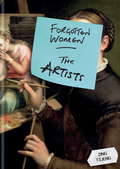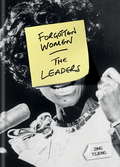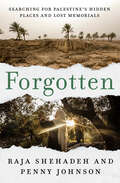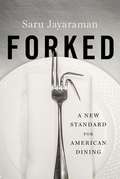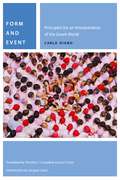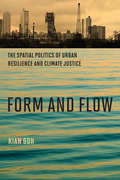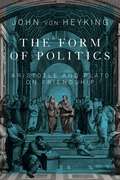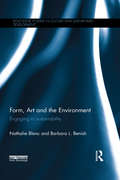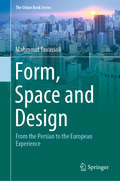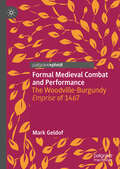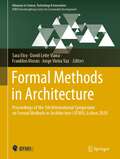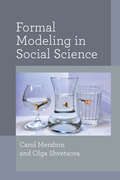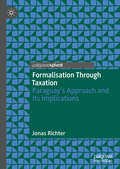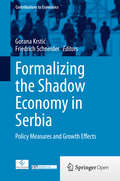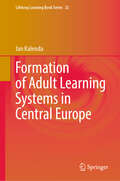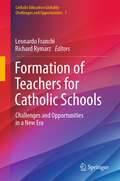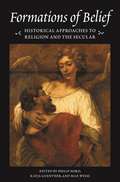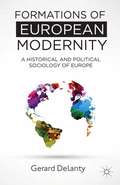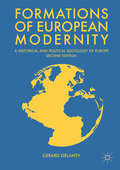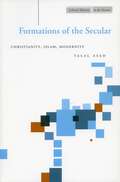- Table View
- List View
Forgotten War (A Matt Drake Novel #4)
by Don Bentley"A fascinating, action-packed thriller from one of the genre's most talented authors. Don Bentley delivers a blistering adventure loaded with excitement and fabulous characters. You will not want it to end!"—Brad Thor, New York Times #1 bestselling author of Dead FallA brotherhood born in battle is endangered by a deadly secret in the latest astonishing thriller from the New York Times bestselling author of Tom Clancy Zero Hour and Hostile Intent.As a team, Matt Drake and his partner, Frodo, have watched each other's backs through some very dark days. But one thing they've never doubted was their commitment to each other...until now. Frodo has been accused of a war crime ten years after leaving Afghanistan. Matt is determined to prove his friend innocent, but what will he do when he finds that his closest friend has secrets he won't share?
Forgotten Women: The Artists (Forgotten Women Ser.)
by Zing Tsjeng'To say this series is "empowering" doesn't do it justice. Buy a copy for your daughters, sisters, mums, aunts and nieces - just make sure you buy a copy for your sons, brothers, dads, uncles and nephews, too.' - IndependentThe women who shaped and were erased from our history.Forgotten Women is a new series of books that uncover the lost herstories of influential women who have refused over hundreds of years to accept the hand they've been dealt and, as a result, have formed, shaped and changed the course of our futures. From leaders and scientists to artists and writers, the fascinating stories of these women that time forgot are now celebrated, putting their achievements firmly back on the map.The Artists brings together the stories of 48* brilliant woman artists who made huge yet unacknowledged contributions to the history of art, including Camille Claudel, the extraordinarily talented sculptor who was always unfairly overshadowed by her lover, Rodin; Baroness Elsa von Freytag-Loringhoven, who has been claimed as the true originator of Marcel Duchamp's Fountain; and Ana Mendieta, the Cuban refugee who approached violence against women through her performance art before her own untimely death. With chapters ranging from Figurative to Photography, and Craft to Conceptual, this is an alternative guide to art history that demonstrates the broad range of artistic movements that included, and were often pioneered by, female artists who have been largely overlooked.*The number of Nobel-prize-winning women.
Forgotten Women: The Artists (Forgotten Women)
by Zing Tsjeng'To say this series is "empowering" doesn't do it justice. Buy a copy for your daughters, sisters, mums, aunts and nieces - just make sure you buy a copy for your sons, brothers, dads, uncles and nephews, too.' - IndependentThe women who shaped and were erased from our history.Forgotten Women is a new series of books that uncover the lost herstories of influential women who have refused over hundreds of years to accept the hand they've been dealt and, as a result, have formed, shaped and changed the course of our futures.The Artists brings together the stories of 48* brilliant woman artists who made huge yet unacknowledged contributions to the history of art, including Camille Claudel, the extraordinarily talented sculptor who was always unfairly overshadowed by her lover, Rodin; Baroness Elsa von Freytag-Loringhoven, who has been claimed as the true originator of Marcel Duchamp's Fountain; and Ana Mendieta, the Cuban refugee who approached violence against women through her performance art before her own untimely death. With chapters ranging from Figurative to Photography, and Craft to Conceptual, this is an alternative guide to art history that demonstrates the broad range of artistic movements that included, and were often pioneered by, female artists who have been largely overlooked.*The number of Nobel-prize-winning women.
Forgotten Women: The Leaders (Forgotten Women Ser.)
by Zing Tsjeng'To say this series is "empowering" doesn't do it justice. Buy a copy for your daughters, sisters, mums, aunts and nieces - just make sure you buy a copy for your sons, brothers, dads, uncles and nephews, too.' - indy100The women who shaped and were erased from our history.The Forgotten Women series will uncover the lost histories of the influential women who have refused over hundreds of years to accept the hand they've been dealt and, as a result, have formed, shaped and changed the course of our futures. The Leaders weaves together 48* unforgettable portraits of the true pioneers and leaders who made huge yet unacknowledged contributions to history, including:Grace O'Malley, the 16th century Irish pirate queenSylvia Rivera, who spearheaded the modern transgender rights movementAgent 355, the unknown rebel spy who played a pivotal role in the American RevolutionNoor Inayat Khan, who went undercover to spy for the French Resistance and became Nazi enemy no. 1Amina of Zazzau, the formidable ancient Muslim warrior queen of Northern NigeriaChapters including Rebels; Warriors; Rulers; Activists and Reformers shine a spotlight on the rebellious women who defied the odds, and the opposition, to change the world around them. *The number of Nobel-prize-winning women.
Forgotten Women: The Leaders (Forgotten Women)
by Zing TsjengSelected for the Evening Standard present gift guide of the year'To say this series is "empowering" doesn't do it justice. Buy a copy for your daughters, sisters, mums, aunts and nieces - just make sure you buy a copy for your sons, brothers, dads, uncles and nephews, too.' - indy100'Here's to no more forgotten women.' Evening StandardThe women who shaped and were erased from our history.The Forgotten Women series will uncover the lost histories of the influential women who have refused over hundreds of years to accept the hand they've been dealt and, as a result, have formed, shaped and changed the course of our futures. The Leaders weaves together 48* unforgettable portraits of the true pioneers and leaders who made huge yet unacknowledged contributions to history, including:Grace O'Malley, the 16th century Irish pirate queenSylvia Rivera, who spearheaded the modern transgender rights movementAgent 355, the unknown rebel spy who played a pivotal role in the American RevolutionNoor Inayat Khan, who went undercover to spy for the French Resistance and became Nazi enemy no. 1Amina of Zazzau, the formidable ancient Muslim warrior queen of Northern NigeriaChapters including Rebels; Warriors; Rulers; Activists and Reformers shine a spotlight on the rebellious women who defied the odds, and the opposition, to change the world around them. *The number of Nobel-prize-winning women.
Forgotten: Searching for Palestine's Hidden Places and Lost Memorials
by Raja Shehadeh Penny JohnsonA profound meditation on memory and the preservation of Palestinian heritage, from the award-winning author of We Could Have Been Friends, My Father and I.Forgotten uncovers the hidden or neglected memorials and places in historic Palestine—now Israel and the Occupied Palestinian Territories—and what they might tell us about the land and the people who live on the small slip of earth between the Mediterranean Sea and the Jordan River.From ancient city ruins to the Nabi 'Ukkasha mosque and tomb, acclaimed writers and researchers Raja Shehadeh and Penny Johnson ask: what has been memorialized, and what lies unseen, abandoned, or erased—and why? Whether standing on a high cliff overlooking Lebanon or at the lowest land-based elevation on earth at the Dead Sea, they explore lost connections in a fragmented land.In elegiac, elegant prose, Shehadeh and Johnson grapple not only with questions of Israeli resistance to acknowledging the Nakba—the 1948 catastrophe for Palestinians—but also with the complicated history of Palestinian commemoration today.
Forked: A New Standard for American Dining
by Saru Jayaraman<p>A restaurant critic can tell you about the chef. A menu can tell you about the farm-sourced ingredients. Now who's going to tell you about the people preparing your meal? <p>From 2015 James Beard Leadership Award winner Saru Jayaraman, Forked is an enlightening examination of what we don't talk about when we talk about restaurants: Is the line cook working through a case of stomach flu because he doesn't get paid sick days? Is the busser not being promoted because he speaks with an accent? Is the server tolerating sexual harassment because tips are her only income? <p>As most corporate restaurants continue to set low standards for worker wages and benefits, a new class of chefs and restaurateurs is working to foster sustainability in their food and their employees. Forked offers an insider's view of the highest--and lowest--scoring restaurants for worker pay and benefits in each sector of the restaurant industry, and with it, a new way of thinking about how and where we eat.</p>
Form and Event: Principles for an Interpretation of the Greek World (Commonalities)
by Carlo DianoCarlo Diano’s Form and Event has long been known in Europe as a major work not only for classical studies but even more for contemporary philosophy. Already available in Italian, French, Spanish, and Greek, it appears here in English for the first time, with a substantial Introduction by Jacques Lezra that situates the book in the genealogy of modern political philosophy.Form and Event reads the two classical categories of its title phenomenologically across Aristotle, the Stoics, and especially Homer. By aligning Achilles with form and Odysseus with event, Diano links event to embodied and situated subjective experience that simultaneously finds its expression in a form that objectifies that experience. Form and event do not exist other than as abstractions for Diano but they do come together in an intermingling that Diano refers to as the “eventic form.” On Diano’s reading, eventic forms interweave subjectively situated and embodied experiences, observable in all domains of human and nonhuman life.A stunning interpretation of Greek antiquity that continues to resonate since its publication in 1952, Form and Event anticipates the work of such French and Italian post-war thinkers as Gilles Deleuze, Alain Badiou, Roberto Esposito, and Giorgio Agamben.
Form and Flow: The Spatial Politics of Urban Resilience and Climate Justice (Urban and Industrial Environments)
by Kian GohAn examination of urban climate change response strategies and the resistance to them by grassroots activists and social movements.Cities around the world are formulating plans to respond to climate change and adapt to its impact. Often, marginalized urban residents resist these plans, offering &“counterplans&” to protest unjust and exclusionary actions. In this book, Kian Goh examines climate change response strategies in three cities—New York, Jakarta, and Rotterdam—and the mobilization of community groups to fight the perceived injustices and oversights of these plans. Looking through the lenses of urban design and socioecological spatial politics, Goh reveals how contested visions of the future city are produced and gain power. Goh describes, on the one hand, a growing global network of urban environmental planning organizations intertwined with capitalist urban development, and, on the other, social movements that themselves often harness the power of networks. She explores such initiatives as Rebuild By Design in New York, the Giant Sea Wall plan in Jakarta, and Rotterdam Climate Proof, and discovers competing narratives, including community resiliency in Brooklyn and grassroots activism in the informal &“kampungs&” of Jakarta. Drawing on participatory fieldwork and her own background in architecture and urban design, Goh offers both theoretical explanations and practical planning and design strategies. She reframes the critical concerns of urban climate change responses, presenting a sociospatial typology of urban adaptation and considering the notion of a &“just&” resilience. Finally, she proposes a theoretical framework for designing equitable and just urban climate futures.
Form of Politics: Aristotle and Plato on Friendship
by John Von HeykingFor statesmen, friendship is the lingua franca of politics. Considering the connections between personal and political friendship, John von Heyking's The Form of Politics interprets the texts of Plato and Aristotle and emphasizes the role that friendship has in enduring philosophical and contemporary political contexts. Beginning with a discussion on virtue-friendship, described by Aristotle and Plato as an agreement on what qualifies as the pursuit of good, The Form of Politics demonstrates that virtue and political friendship form a paradoxical relationship in which political friendships need to be nourished by virtue-friendships that transcend the moral and intellectual horizons of the political society. Von Heyking then examines Aristotle's ethical and political writings - which are set within the boundaries of political life - and Plato's dialogues on friendship in Lysis and the Laws, which characterize political friendship as festivity. Ultimately, arguing that friendship is the high point of a virtuous political life, von Heyking presents a fresh interpretation of Aristotle and Plato's political thought, and a new take on the most essential goals in politics. Inviting reassessment of the relationship between friendship and politics by returning to the origins of Western philosophy, The Form of Politics is a lucid work on the foundations of political cooperation.
Form, Art and the Environment: Engaging in Sustainability (Routledge Studies in Culture and Sustainable Development)
by Nathalie Blanc Barbara L. BenishForm, Art and the Environment: Engaging in Sustainability adopts a pluralistic perspective of environmental artistic processes in order to examine the contributions of the arts in promoting sustainable development and culture at a grassroots level and its potential as a catalyst for social change and awareness. This book investigates how community arts, environmental creativity, and the changing role of artists in the Polis contribute to the goal of a sustainable future from a number of interdisciplinary perspectives. From considering the role that art works play in revealing local environmental problems such as biodiversity, public transportation and energy issues, to examining the way in which artists and art works enrich our multidimensional understanding of culture and sustainable development, Form, Art and the Environment advocates the inestimable value of art as an expressive force in promoting sustainable culture and conscious development. Utilising a broad range of case studies and analysis from a body of work collected through the international environmental COAL prize, this book examines the evolution of the relationship between culture and the environment. This book will be of interest to practitioners of the environmental arts, culture and sustainable development and students of Art, Environmental Science, and International Policy and Planning Development.
Form, Space and Design: From the Persian to the European Experience (The Urban Book Series)
by Mahmoud TavassoliThis book studies the principles of urban spatial organization of historic cities. It can be considered a guide to design, presenting qualitative criteria to satisfy practical needs. The subject is explored through interconnected chapters, each addressing an important aspect of form-space and design values, knowledge and our present problems. In this book the interpretation is artistic and socio-cultural. Discussion is not concentrated on singular urban space but on interrelated spaces and elements across the city, and complexes. Considering the comparative aspects of study, the reader will notice that despite cultural differences, there is a common understanding in artistic creativity and sensibility in the presented examples.
Formal Medieval Combat and Performance: The Woodville-Burgundy Emprise of 1467
by Mark GeldofThis book collects together all contemporary and near-contemporary accounts of the 1467 emprise, a particular performative feat of arms, between Anthony Woodville, Lord Scales—brother of Elizabeth Woodville, wife of King Edward IV of England—and Antoine, &‘Grand Bastard of Burgundy,&’ natural son of Duke Philip &‘the Good&’ of Burgundy. Held at Smithfield, London, this emprise has long interested historians of chivalry because of the detailed accounts of its organization and the commentaries on the combats held over two days. Despite its familiarity to readers of late medieval English and European history, the accounts themselves have not historically been easily accessible, and several of them have never appeared in translation in English before now. This collection gathers those accounts, presents them in readable English editions, and gives historical contexts for their content.
Formal Methods in Architecture: Proceedings of the 5th International Symposium on Formal Methods in Architecture (5FMA), Lisbon 2020 (Advances in Science, Technology & Innovation)
by Sara Eloy David Leite Viana Franklim Morais Jorge Vieira VazThis edited book gathers research studies presented at the 5th International Symposium on Formal Methods in Architecture (5FMA), Lisbon 2020. Studies focus on the use of methodologies, especially those that have witnessed recent developments, that stem from the mathematical and computer sciences and are developed in a collaborative way with architecture and related fields. This book constitutes a contribution to the debate and to the introduction of new methodologies and tools in the mentioned fields that derive from the application of formal methods in the creation of new explicit languages for problem-solving in architecture and urbanism. It adds valuable insight into the development of new practices solving identified societal problems and promoting the digital transformation of institutions in the mentioned fields. The primary audience of this book will be from the fields of architecture, urban planning, civil engineering, AEC, landscape design, computer sciences and mathematics, both academicians and professionals.
Formal Modeling in Social Science
by Carol Mershon Olga ShvetsovaA formal model in the social sciences builds explanations when it structures the reasoning underlying a theoretical argument, opens venues for controlled experimentation, and can lead to hypotheses. Yet more importantly, models evaluate theory, build theory, and enhance conjectures. Formal Modeling in Social Science addresses the varied helpful roles of formal models and goes further to take up more fundamental considerations of epistemology and methodology. The authors integrate the exposition of the epistemology and the methodology of modeling and argue that these two reinforce each other. They illustrate the process of designing an original model suited to the puzzle at hand, using multiple methods in diverse substantive areas of inquiry. The authors also emphasize the crucial, though underappreciated, role of a narrative in the progression from theory to model. Transparency of assumptions and steps in a model means that any analyst will reach equivalent predictions whenever she replicates the argument. Hence, models enable theoretical replication, essential in the accumulation of knowledge. Formal Modeling in Social Science speaks to scholars in different career stages and disciplines and with varying expertise in modeling.
Formal Models of Domestic Politics
by Scott GehlbachFormal Models of Domestic Politics offers the first unified and accessible treatment of canonical and important new formal models of domestic politics. Intended for students in political science and economics who have already taken a course in game theory, the text covers eight classes of models: electoral competition under certainty and uncertainty, special interest politics, veto players, delegation, coalitions, political agency, and regime change. Political economists, comparativists, and Americanists alike will find models here central to their research interests. The text assumes no mathematical knowledge beyond basic calculus, with an emphasis placed on clarity of presentation. Political scientists will appreciate the simplification of economic environments to focus on the political logic of models; economists will discover many important models of politics published outside of their discipline; and both instructors and students will value the numerous classroom-tested exercises.
Formal Peace and Informal War: Security and Development in Congo (Routledge Explorations in Development Studies)
by Zoë MarriageNorthern interventions into African countries at war are dominated by security concerns, bolstered by claims of shared returns and reinforcing processes of development and security. As global security and human security became prominent in development policy, Congo was wracked by violent rule, pillage, internal fighting, and invasion. In 2002, the Global and All-Inclusive Peace was promoted by northern donors, placing a formal peace on the mass of informalised wars. Formal Peace and Informal War: Security and Development in Congo examines how the security interests of the Congolese population have interacted with those of northern donors. It explores Congo’s contemporary wars and the peace agreed on in 2002 from a security perspective and challenges the asserted commonality of the liberal interventions made by northern donors. It finds that the peace framed the multiple conflicts in Congo as a civil war and engineered a power-sharing agreement between elite belligerents. The book argues that the population were politically and economically excluded from the peace and have been subjected to control and containment when their security rests with power and freedom.
Formalisation Through Taxation: Paraguay’s Approach and Its Implications
by Jonas RichterIn developing countries, such as Paraguay, informality remains a prevalent and persistent issue. Many avoid formal registration with the authorities and evade tax payments. However, a growing academic literature argues for an interrelation between a broader tax base and a country’s economic and democratic development. A strand of this literature focuses on the means of taxing the informal sector and argues for positive revenue and growth effects. This Palgrave Pivot analyses Paraguay’s 2004 and 2012 tax reforms using both qualitative and quantitative data. It illustrates that the country’s personal income tax, as well as other alterations in the tax system, constitute an incentive and nudging mechanism that leads to a formalisation process of economic activity, and consequently to a broader tax base. Using interview and tax data, the book demonstrates how the reform initiates a rising demand of formalised purchases from both customers and businesses. It further suggests a potential way of how the taxpayers respond politically to the enhanced fiscal imperative.
Formalizing the Shadow Economy in Serbia
by Friedrich Schneider Gorana KrstićThe main objective of this book is to develop a strategy and policy measures to enhance the formalization of the shadow economy in order to improve the competitiveness of the economy and contribute to economic growth; it explores these issues with special reference to Serbia. The size and development of the shadow economy in Serbia and other Central and Eastern European countries are estimated using two different methods (the MIMIC method and household-tax-compliance method). Micro-estimates are based on a special survey of business entities in Serbia, which for the first time allows us to explore the shadow economy from the perspective of enterprises and entrepreneurs. The authors identify the types of shadow economy at work in business entities, the determinants of shadow economy participation, and the impact of competition from the informal sector on businesses. Readers will learn both about the potential fiscal effects of reducing the shadow economy to the levels observed in more developed countries and the effects that formalization of the shadow economy can have on economic growth.
Formation of Adult Learning Systems in Central Europe (Lifelong Learning Book Series #32)
by Jan KalendaThis book explores the formation and development of the cross-national patterns of adult learning systems between 1989 and 2019 in four Central European countries: the Czech Republic, Slovakia, Hungary and Poland. Drawing on the approach of the political economy of adult education and historical institutionalism, the book closely examines (1) how the institutional settings in these countries have formed, evolved and contributed to overall participation in adult education and training, (2) how they have shaped patterns of participation and unequal chances to be involved in this social activity, as well as (3) perceived barriers to access organized learning and related governmental policies. This book offers a contemporary overview of key findings regarding adult learning systems. It delves into the factors that influence participation in adult education and training. Through the utilization of the novel framework, GALS (Global Adult Learning Space), the book not only highlights a crucial distinction among adult learning systems within the region but also presents in-depth case studies of these systems in Poland, the Czech Republic, Hungary, and Slovakia spanning a 30-year period. Despite these countries sharing similar institutional backgrounds and societal challenges, the book reveals that their adult learning systems have undergone divergent trajectories over the past three decades. This book will be useful to researchers and scholars in the fields of adult education, comparative education, welfare policy, sociology of education, and European studies.
Formation of Teachers for Catholic Schools: Challenges and Opportunities in a New Era (Catholic Education Globally: Challenges and Opportunities #1)
by Richard Rymarz Leonardo FranchiThis book explores in a theoretical and practical sense the challenges and opportunities arising in the initial and ongoing formation processes for teachers in Catholic schools. It showcases a range of international perspectives on how prospective teachers for Catholic schools are prepared both academically and pastorally for their professional role. Divided into two parts, Part 1 of the book focuses on certain countries in the Anglosphere; each country with a dedicated chapter in which the academic and pastoral approaches to teacher formation are examined in the context of its particular cultural, political and religious landscape. Part 2 of the book examines specific areas of interest with particular reference to what it means for the Catholic Church’s mission to offer suitable formation to its corps of teachers. Building on the editors' previous work, this book offers a fresh perspective on this subject by bringing together observations from selected local contexts on what Catholic teacher formation looks like as a set of organised processed and structures. It also shows how the study of educational themes offers challenges to current practices, but also opportunities for fruitful engagement with other educational perspectives.
Formations of Belief: Historical Approaches to Religion and the Secular (Publications in Partnership with the Shelby Cullom Davis Center at Princeton University #6)
by Peter Brown Yaacob Dweck Muhammad Qasim Zaman Max Weiss Caterina Pizzigoni Anthony Grafton Peter E. Gordon Brad S. Gregory Victoria Smolkin Stefania Pastore Professor Katja GuentherFor decades, scholars and public intellectuals have been predicting the demise of religion in the face of secularization. Yet religion is undergoing an unprecedented resurgence in modern life—and secularization no longer appears so inevitable. Formations of Belief brings together many of today's leading historians to shed critical light on secularism's origins, its present crisis, and whether it is as antithetical to religion as it is so often made out to be.Formations of Belief offers a more nuanced understanding of the origins of secularist thought, demonstrating how Reformed Christianity and the Enlightenment were not the sole vessels of a worldview based on rationalism and individual autonomy. Taking readers from late antiquity to the contemporary era, the contributors show how secularism itself can be a form of belief and yet how its crisis today has been brought on by its apparent incapacity to satisfy people's spiritual needs. They explore the rise of the humanistic study of religion in Europe, Jewish messianism, atheism and last rites in the Soviet Union, the cult of the saints in colonial Mexico, religious minorities and Islamic identity in Pakistan, the neuroscience of religion, and more.Based on the Shelby Cullom Davis Center Seminars at Princeton University, this incisive book features illuminating essays by Peter Brown, Yaacob Dweck, Peter E. Gordon, Anthony Grafton, Brad S. Gregory, Stefania Pastore, Caterina Pizzigoni, Victoria Smolkin, Max Weiss, and Muhammad Qasim Zaman.
Formations of European Modernity: A Historical and Political Sociology of Europe
by G. DelantyThis book presents a historical and political sociology of European history and society. It offers a critical interpretation of the course of European history looking at the emergence of the idea of Europe and the emergence of modernity.
Formations of European Modernity: A Historical and Political Sociology of Europe
by Gerard DelantyThis book presents a historical and political sociology of European history and society. It offers a critical interpretation of the course of European history looking at the emergence of the idea of Europe and the formation of modernity. Now fully updated, Delanty's second edition features commentary on Brexit, populism, the refugee crisis, and secessionism, as well as additional coverage of colonialism and the wider global context. The book will be in an invaluable resource for advanced undergraduates and postgraduate students of historical sociology, the history of Europe, nations and modernity, political sociology, and political and social theory.
Formations of the Secular
by Talal AsadOpening with the provocative query “what might an anthropology of the secular look like?” this book explores the concepts, practices, and political formations of secularism, with emphasis on the major historical shifts that have shaped secular sensibilities and attitudes in the modern West and the Middle East. Talal Asad proceeds to dismantle commonly held assumptions about the secular and the terrain it allegedly covers. He argues that while anthropologists have oriented themselves to the study of the “strangeness of the non-European world” and to what are seen as non-rational dimensions of social life (things like myth, taboo, and religion),the modern and the secular have not been adequately examined. The conclusion is that the secular cannot be viewed as a successor to religion, or be seen as on the side of the rational. It is a category with a multi-layered history, related to major premises of modernity, democracy, and the concept of human rights. This book will appeal to anthropologists, historians, religious studies scholars, as well as scholars working on modernity.

